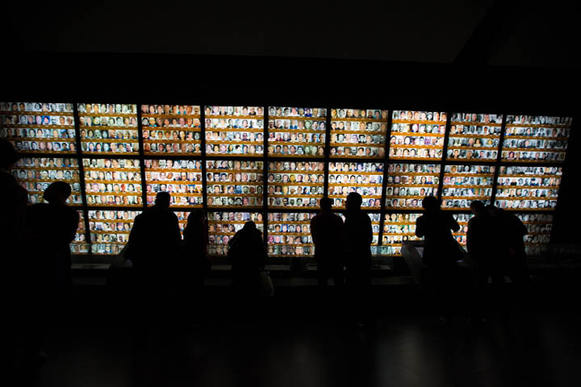Memorial Day: Set to Honor Victims and Remember History
By ZHU CHENGSHAN
On February 27, 2014 the Standing Committee of the National People’s Congress passed a decision on a memorial day to honor victims of the Nanjing Massacre. The move is in response to a strong call from the Chinese people for a national salute to the victims and is also in line with international norms. The memorial day, as remembrance of a horrific episode in China’s history, is bound to have a global impact.
|
 |
|
Visitors mourn war victims at the Memorial Hall of the Victims in the Nanjing Massacre by Japanese Invaders. The photo was taken on December 12, 2013, one day before the massacre’s 76th anniversary. |
International Norms
Since the end of World War II, many countries in the world have taken various steps to commemorate the loss of life during the conflict. Commemorative events include inviting people from all walks of life to pay homage to those who lost their lives and reflect deeply and comprehensively on the war and its legacy.
On January 27, 1945, Auschwitz-Birkenau in Poland, the largest Nazi concentration camp, was liberated by the Soviet troops. Soon after its founding in 1945, through national legislation, Poland made January 27 a day to commemorate the victims of WWII. Every year, war survivors, veterans who participated in the liberation of the camp and state leaders are invited to attend memorial activities at the Auschwitz-Birkenau National Museum. Similar commemorations are held elsewhere in the country. In November 2005, the United Nations General Assembly designated January 27 as International Holocaust Remembrance Day. Every year on this day, memorial ceremonies take place in major world cities like New York and Paris, as well as in significant theaters of the war such as Berlin, and in Jerusalem.
As for the war that was waged on the other side of the globe, shortly after the attack on Pearl Harbor on December 7, 1941, President Roosevelt acknowledged the day as one “that will live in infamy” and declared war on Japan. Every year on this day, the U.S. government, the military and the general public attend various ceremonies to commemorate the event. Across the country, local governments lower their flags to half-mast, and military processions and wreath-laying ceremonies take place to honor the 2,400 or more Americans who died in the event. Today, December 7 is commonly known as Pearl Harbor Day in the States. In December 2013, President Obama took one step further by proclaiming the date as National Pearl Harbor Remembrance Day.
To honor victims of the 1945 atomic bombings of Hiroshima and Nagasaki, on August 6 and 9 of every year since the end of WWII – except for in 1951 when the Korean War was in full swing – Japan has held large-scale memorial ceremonies in the two cities. The Japanese Prime Minister, speakers of both the House of Representatives and the House of Councilors, and leaders of Japan’s major parties usually attend the ceremonies in both places. Since 1999, delegates from major countries possessing nuclear weapons have also been invited to attend the memorial ceremonies. In the past, the U.S. had declined invitations to these ceremonies, but since 2011, it has sent representatives to take part. U.N. Secretary-General Ban Ki-moon was invited to the ceremonies in 2010.
Comparatively, China’s national memorial day has come a bit late.
People’s Call
A national memorial day for the Nanjing Massacre has been strongly called for by the Chinese people for many years.
Starting on December 13, 1937, Japanese aggressors went on a killing spree in Nanjing that lasted over 40 days and left over 300,000 innocent citizens dead.
The outrage, blatantly defying International Law, appalled millions of the Chinese people. Since December 13, 1994, a memorial ceremony attended by the survivors and families of the victims has been held in Nanjing yearly. But, feeling the need for greater recognition, attendees have repeatedly appealed to the central government to attach more importance to commemorations for the Nanjing Massacre and elevate remembrance to a national level. Experts and scholars on the Nanjing Massacre also proposed that local-level remembrance was not enough to mourn the victims. A top-level ceremony attended by state leaders should be held to properly honor the dead and express the entire nation’s vow to learn lessons from history.
Deputies to the National People’s Congress (NPC) and members of the National Committee of the Chinese People’s Political Consultative Conference (CPPCC) brought the people’s appeal to the annual sessions several times. On March 9, 2005, at the Third Session of the 10th National Committee of the CPPCC, Zhao Long, a member of the Standing Committee of the 10th National Committee of the CPPCC and vice-chairman of the Standing Committee of Jiangsu Provincial People’s Congress, first presented the proposal to make December 13 the national memorial day. On March 9, 2012, Zhao again proposed it at the Fifth Session of the 11th National Committee of the CPPCC. The following day at the Fifth Session of the 11th National People’s Congress, deputy Zou Jianping, also president of Nanjing University of the Arts, submitted a similar proposal for a national memorial ceremony to honor the victims of the Nanjing Massacre.
The designating of the national memorial day complies with the people’s will, which is above all else.
